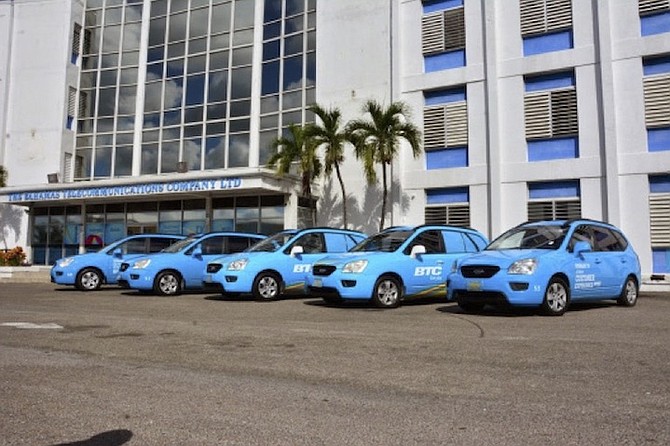By NEIL HARTNELL
Tribune Business Editor
nhartnell@tribunemedia.net
The Bahamas Telecommunications Company's (BTC) $13.6m first-half revenue decline last night underscored the urgency of pleas for corporate unity as its business continues to slip away.
Figures for the first six months of 2019, released by its ultimate parent, Liberty Latin America, revealed that BTC's top-line for the period was down by 11.4 percent year-over-year as it lost a further 9,300 mobile subscribers during the second quarter.
Liberty Latin America's 10-Q filing with the US Securities & Exchange Commission (SEC) showed BTC's 2019 first half revenues fell to $106.1m compared to $119.7m in the same period last year, indicating that its loss of mobile market share to Aliv is continuing.
The Bahamian communications carrier's revenues for the 2019 second quarter, which includes the three months to end-June, were also off 7.4 percent year-over-year at $52.5m compared to $56.7m for 2018.
The top-line declines appear to have been driven by a further 9,300 net loss of mobile subscribers during the 2019 second quarter, which challenges the optimism expressed by Garfield "Garry" Sinclair, BTC's chief executive, that market share declines were starting to "plateau" in his recent interview with Tribune Business.
Data provided by Liberty Latin America showed that a modest gain of 700 post-paid mobile subscribers was more than offset by the loss of another 10,000 pre-paid customers during the three months to end-June 2019.
This left BTC with some 213,500 mobile subscribers as at June 30, split between 188,000 pre-paid customers and 25,500 post-paid subscribers, with the numbers providing further evidence that its upstart rival, Aliv, continues to eat into its market share and legacy monopoly.
Liberty Latin America's results announcement reiterated that BTC continues to be a drag on the performance of Cable & Wireless Communications (CWC), its immediate parent, which was acquired by the former some years after the 2011 privatisation.
It said of CWC: "Mobile revenue attrition of 9 percent on a rebased basis was partly offset by rebased revenue growth of 4 percent in B2B (business) and 1 percent in residential fixed.
"The reduction in mobile revenue year-over-year was primarily attributable to lower service revenue in Panama and The Bahamas, where continued competition drove decreases in ARPU (average revenue per user) and the average number of subscribers."
BTC's subscriber numbers showed virtually no positive improvement elsewhere. Customer numbers excluding mobile fell by 2,900 during the 2019 second quarter, with TV/video and Internet subscribers declining by 500 apiece and fixed-line telephone customers down by 1,900.
While BTC's infrastructure passes some 128,900 Bahamian homes, it had just 6,100 TV/video and 25,700 Internet customers at end-June 2019. Telephone customers totalled 44,400, bringing BTC's non-mobile revenue generating units to 76,200.
The data provides ample evidence to back Mr Sinclair's warning to BTC's two trade unions that their tactics "could be fatal" to a business that has lost $110m in annual revenue in less than three years, going from a $330m top-line to one that is nearer $220m.
BTC's half-year revenue pace suggests breaking the $200m revenue mark could be a struggle, further supporting Mr Sinclair's contention that the former government monopoly will face "an existential crisis" as it tries to "win again" in a fiercely competitive market unless the unions "stop finding a dark cloud behind every silver lining".
In an impassioned call for unity within BTC, Mr Sinclair told Tribune Business in a recent interview that both the line staff and management union must "resist the temptation to fall back into ancient habits and practices from the monopoly days" if the carrier is to adjust its business model and properly compete with the likes of Cable Bahamas and Aliv.
Voicing disquiet at the two unions' seeming tendency to "sow dissent and extend controversy at the first sign of adversity", Mr Sinclair argued that BTC had still to adjust to the loss of its long-standing mobile monopoly and the need to compete in a liberalised Bahamian communications market.
"We're no longer a $330m a year revenue business. We're a $220m business," he said recently. "If we don't make that adjustment we're in an existential crisis. It's been tough to make adjustments to the operating model now that it has one-third less revenue. The ability to do that has been tough."
However, the numbers revealed last night also seemingly challenge Mr Sinclair's assertion that mobile subscriber churn is declining sharply and that BTC is doing a better job of retaining market share in the battle with Aliv.
Mr Sinclair had said in his recent interview with Tribune Business that BTC's loss of mobile subscribers to Aliv had been on "a fairly steep decline", with the rate of attrition falling by 32,000 in 2018 compared to the prior year. He added that 2019 to-date had produced further evidence that these customer losses were starting to bottom out.
"The target was to cut prior year churn in half," Mr Sinclair said of BTC's 2019 mobile targets. "We're well ahead of that target, and would have been even further ahead but we made some decisions with respect to subsidised handsets and our investment in subsidised handsets.
"We're going to revisit that in the second half, and you'll find us way more competitive there." He added that BTC also planned to introduce a "simplified" range of new mobile plans, along with a "fresh-fixed line proposition", that customers will find "particularly compelling" heading into the 2019 second half and final quarter.





Comments
John 6 years, 6 months ago
What is Firefox the Disney Channel Netflix? Competition costing less than $20 a month compared to Cable and Btc flow for $100 a month for basic
Sign in to comment
OpenID